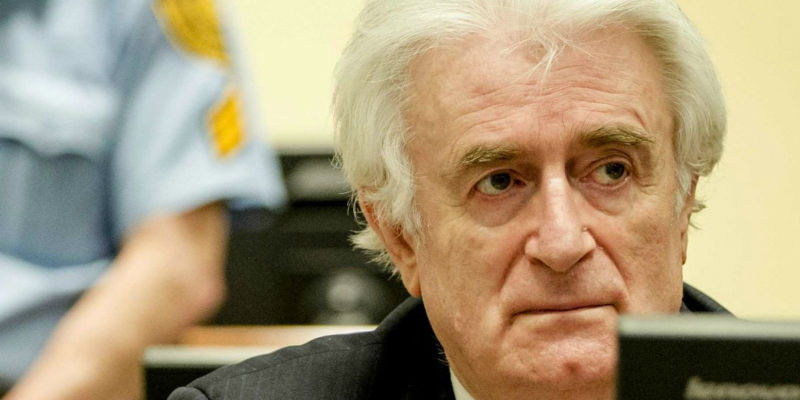Karadzic puts the government in a difficult spot and divides the opposition

The decision of the Hague tribunal to impose a life sentence on the former Bosnian Serb political leader Radovan Karadzic has sparked a variety of reactions in Serbia. Some have welcomed the decision, some have criticized it and some others have been silent, either because they do not want to be reminded of their “sinful” past or because they are political compatriots with praisers of Karadzic and the Serbian great-idea.
Thus, Aleksandar Vucic’s ruling Serbian Progressive Party (SNS), which in the not-so-distant past ranked Karadzic in the pantheon of the heroes of the Serbian nation, showed no sensitivity. There were no dictatrams about Karadzic’s heroic struggle in defending the Serbian nation, nor any curses against foreigners, who through the Hague tribunal try to humiliate the Serbian people.
Of course, no one expected Vucic to take to the streets and place street signs with the name of Radovan Karadzic – just like he did when he was in the opposition – but a declaration of humanly sympathy for his idol was expected. Even an ambiguous statement that one would attribute the importance one desired, so that tomorrow his colleagues could “feed” the ultra-nationalists who support him.
Instead, Vucic chose to be in Lower Saxony and discuss with Volkswagen representatives about the creation of a production unit in Serbia that will employ thousands of workers. The future seems to have defeated the past and Karadzic was sacrificed on the altar of growth and prosperity.
The opposite was the case in the opposition, where the Alliance for Serbia (SzS) coalition sacrificed the future at the altar of the present and remained silent to the fact of Karadzic’s conviction. A strange silence that has not gone unnoticed and disappointed the progressive citizens who have been demonstrating for months against the old, outdated, against the extreme nationalism and intolerance that Karadzic was serving.
The polls show that the majority of the citizens involved in the protests against Vucic are from the area of social democracy and the progressive center-left. All of them therefore waited, if anything, from the opposition coalition, which claims the paternity of the mobilizations, to hear some words that would welcome the decision of the court in The Hague to close Karadzic’s ill-fated nationalist plans in prison’s history, for life, forever! Not even the phrase that “Karadzic’s conviction acquits the Serbs from collective responsibility” was heard by the Szs political coalition.
The nationalist right, represented by Bosko Obradovic and the Dveri movement, appears to have been imposed on the Alliance for Alliance for Serbia. And while the informal leader of the coalition, Dragan Djilas, did not find the courage to express an opinion on the Karadzic issue, in order not to dislike his nationalist allies, Obradovic was fast to condemn the court’s decision in The Hague and call war criminals all – former and current – leaders of Western countries.
After last week’s invasion of protesters in public television, led by Obradovic, without any prior understanding with his partners, it appeared that the nationalists have imposed their opinions on the opposition coalition. This was confirmed with the silence about Karadzic. The heterogeneous political schema, with the appearance of the first crisis, highlighted its weaknesses. What will happen when it is called upon to take a stand on current national issues such as Kosovo? It is now clear that in the form it has today it can’t work.
The common enemy, the Vucic regime, is not enough to ensure coherence. There is need of a vision for the future and it is doubtful whether it can be offered when half of the “Alliance for Serbia” coalition parties make heroes of war criminals, see demons in the EU, and saviors in Putin’s Russia.
/ibna/